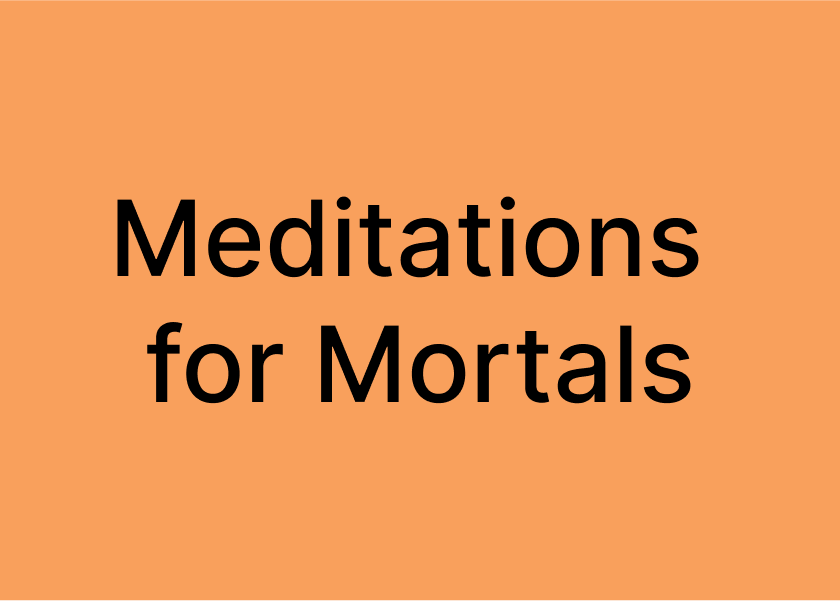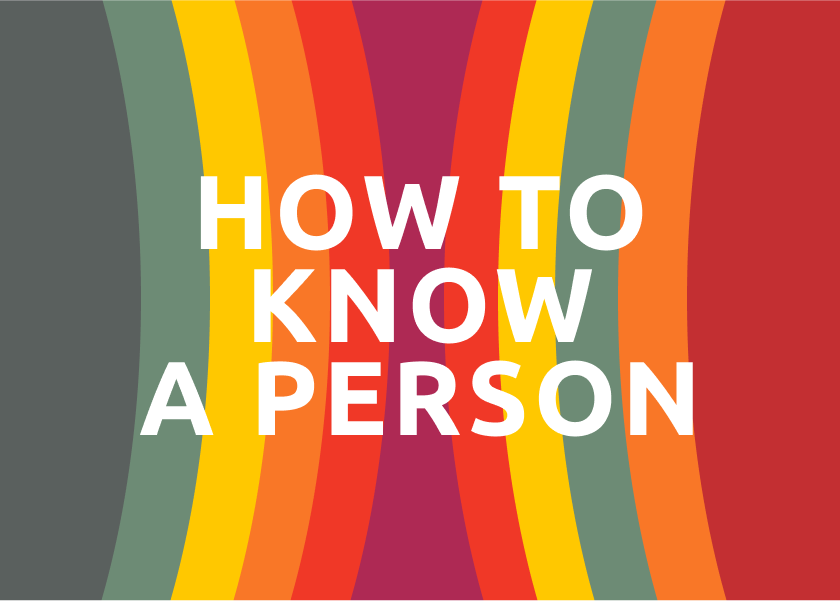Meditations for Mortals by Oliver Burkeman - Summary
Feeling overwhelmed? Embrace your limits and unlock a more meaningful life. Learn to take action, let go of control, and find joy in the imperfect present. This book will help you start this journey now.

The following is a summary and review of Meditations for Mortals by Oliver Burkeman.
Listen to ShelfHelp's podcast summarising Meditations for Mortals by Oliver Burkeman.
Finding Freedom in Our Limitations
Are you tired of feeling like you're constantly falling behind, striving for an unattainable ideal of productivity and control? Do you long for a way to embrace life without the relentless pressure to optimise and achieve? If so, Oliver Burkeman's Meditations for Mortals: Four Weeks to Embrace Your Limitations and Make Time for What Counts offers a profound and surprisingly liberating perspective. This isn't another self-help book promising a quick fix, but rather a thoughtful exploration of how accepting our inherent finitude can lead to a richer, more meaningful existence. This summary delves into the book's key ideas, providing a roadmap to its insights and actionable advice. Reading this will give you a strong understanding of Burkeman's central arguments and whether embarking on the full four-week "retreat of the mind" is right for you.
Table of Contents
- About the Author
- Who Should Read This Book?
- Key Insights and Themes
- Detailed Summary
- Review
- Actionable Takeaways
- FAQs
- Conclusion
About the Author
Oliver Burkeman is a British author and journalist renowned for his insightful and often counter-intuitive perspectives on productivity, happiness, and the human condition. He worked for many years at The Guardian, where his popular weekly column, This Column Will Change Your Life, explored psychology and self-improvement with a refreshingly critical and humorous approach. He is also the author of the New York Times bestseller Four Thousand Weeks: Time Management for Mortals (read the summary), which similarly challenges conventional wisdom about time management. Burkeman's writing is characterised by its intellectual rigour, relatable personal anecdotes, and a deep understanding of the anxieties of modern life. His work has established him as a significant voice in the realm of practical philosophy and mindful living.
Who Should Read This Book?
Meditations for Mortals is for anyone who:
- Feels overwhelmed by the endless demands and opportunities of modern life.
- Struggles with the feeling of constantly falling behind or not doing enough.
- Is weary of the relentless pursuit of productivity and self-improvement.
- Experiences anxiety related to the future, control, and the fear of not living up to their potential.
- Is interested in exploring a more compassionate and realistic approach to life.
- Is seeking a way to find more meaning and enjoyment in the present moment.
- Has found traditional self-help advice to be ineffective or anxiety-inducing.
Essentially, if you recognise the "vague sense that I’m falling behind, and need to claw my way back up to a minimum standard of output", or if you're tired of waiting for the day when "all the other stuff will be ‘out of the way,’ so you can turn at last to building a life of meaning and accomplishment", this book offers a compelling alternative.
Key Insights and Themes
Here are some of the key insights and themes explored in Meditations for Mortals:
- Embracing Finitude: The book argues that accepting our limited time, energy, and control is not a source of despair but a pathway to liberation and a more meaningful life.
- The Illusion of Control: Modern life often fosters the misguided idea that we can and should control reality. Letting go of this illusion reduces anxiety and allows for more effective action.
- Imperfect Action: Instead of striving for perfection or waiting for the ideal moment, the book champions taking bold, imperfect action in the present.
- The Power of "Done": Shifting focus from endless to-do lists to celebrating completed tasks ("done list") can combat feelings of productivity debt and foster a sense of accomplishment.
- Information Overload: The book offers strategies for navigating the overwhelming influx of information by treating the "to-read" pile like a river and resisting the urge to stockpile knowledge.
- Choosing What to Care About: In a world demanding constant attention to global issues, it's crucial to consciously choose which battles to fight and accept our limitations in caring about everything.
- Decision-Hunting: Proactive decision-making, rather than endless deliberation, is key to overcoming procrastination and moving forward.
- Finishing Over Starting: The book emphasises the importance of completing tasks, even imperfectly, over perpetually starting new ones.
- Finding Your "Life Task": Identifying and pursuing a "life task" – something difficult but enlarging – can provide a sense of direction and meaning.
- Befriending What You Fear: Instead of fighting avoidance, the book suggests a gentler approach of "befriending your rats" – acknowledging and understanding the tasks we tend to put off.
- "Dailyish" Over Daily: Embracing a more flexible approach to routines ("dailyish") is more sustainable and less prone to failure than rigid, all-or-nothing strategies.
- The Three-to-Four-Hour Rule: Limiting intense mental focus to around three or four hours a day can maximise productivity and prevent burnout.
- The False Allure of Effort: The book challenges the notion that worthwhile actions must always be difficult, suggesting that sometimes the key is to "let it be easy".
- Self-Compassion: Being kinder to oneself is crucial for overcoming self-sabotage and making progress.
- Allowing Others Their Problems: Over-involvement in other people's emotions can be draining and ineffective. The book advocates for allowing others to experience their own feelings.
- Setting Quantity Goals: Focusing on the quantity of output rather than immediate quality can liberate creativity and overcome perfectionism.
- Embracing Distraction: Instead of fighting interruptions, the book suggests giving them full attention and then returning to the task at hand.
- Living in the Present: The book encourages readers to move away from a "provisional life" focused solely on future goals and to engage more fully with the present moment.
- "Scruffy Hospitality": Extending hospitality without the pressure of a perfectly kept house fosters genuine connection.
- Accepting Imperfection in Others: Recognising that everyone is flawed and struggling ("low anthropology") leads to greater compassion and connection.
- Trusting Intuition: While intellect is valuable, the book acknowledges the importance of intuition and acting even when understanding is incomplete.
- "C'est Fait Par Du Monde": Remembering that even the most astounding achievements were made by ordinary, finite people can inspire action and reduce self-doubt.
- Finding Your Own "What Matters": The book refrains from prescribing a specific path to a meaningful life, emphasising the importance of individual discovery and valuing local, transient acts.
Detailed Summary
The book is structured as a four-week "retreat of the mind", with each week focusing on a different aspect of "imperfectionism".
Week One: Being Finite
- Day One: It’s worse than you think On the liberation of defeat: Burkeman argues that accepting the overwhelming nature of tasks and our limited capacity isn't depressing, but liberating. Owning up to reality allows us to interact with what is true.
- Day Two: Kayaks and superyachts On actually doing things: The allure of systems for self-improvement is strong, but the real answer to doing what matters is simply to start. We are always in a "kayak," not a perfectly controlled "superyacht".
- Day Three: You need only face the consequences On paying the price: Every choice involves trade-offs. Overthinking potential negative consequences often prevents us from making bold choices. Freedom lies in accepting the responsibilities of our choices.
- Day Four: Against productivity debt On the power of a ‘done list’: The feeling of "productivity debt" – needing to justify our existence through achievement – is common. Keeping a "done list" focuses on what we have accomplished, countering this feeling.
- Day Five: Too much information On the art of reading and not reading: We are drowning in information. Treat your "to-read" pile like a river, not a bucket, and resist the urge to stockpile knowledge. Consuming information should also be a present-moment activity.
- Day Six: You can’t care about everything On staying sane when the world’s a mess: Digital technology asks us to care about everything with maximum intensity. It's essential to pick your battles and not feel bad about doing so to avoid becoming paralysed.
- Day Seven: Let the future be the future On crossing bridges when you come to them: Worrying about future problems in advance is often unproductive. Focus on the present and address challenges as they arise.
Week Two: Taking Action
- Day Eight: Decision-hunting On choosing a path through the woods: Instead of waiting for decisions to come along, actively seek out small decisions to make to get unstuck. "Choosing" is different from "trying to decide".
- Day Nine: Finish things On the magic of completion: Repeatedly starting but rarely finishing leads to misery. Redefine "finished" as small, achievable "deliverables" to foster a sense of accomplishment.
- Day Ten: Look for the life task On what reality wants: Identify your current "life task" – something difficult but "enlarging". It should be achievable within your current circumstances.
- Day Eleven: Just go to the shed On befriending what you fear: Avoidance leads to more anxiety. Instead of battling intimidating tasks, "befriend your rats" – acknowledge them and allow them to patiently wait their turn.
- Day Twelve: Rules that serve life On doing things dailyish: Rigid rules can be counterproductive. A "dailyish" approach – doing something more days than not – is more sustainable and focuses on the activity itself, not the unbroken chain.
- Day Thirteen: Three hours On finding focus in the chaos: For "knowledge workers," limiting intense mental focus to about three or four hours a day can maximise progress. Embrace the chaos of the rest of the day.
- Day Fourteen: Develop a taste for problems On never reaching the trouble-free phase: Life will always present problems. Develop a tolerance for them rather than striving for a problem-free existence.
Week Three: Letting Go
- Day Fifteen: What if this were easy? On the false allure of effort: Meaningful action doesn't always require immense effort. Sometimes, asking "What if this might be a lot easier than I’d been assuming?" can unlock progress.
- Day Sixteen: The reverse golden rule On not being your own worst enemy: We are often far more critical of ourselves than we would be of others. Practice self-compassion to overcome self-sabotage.
- Day Seventeen: Don’t stand in generosity’s way On the futility of ‘becoming a better person’: Focus on acting generously now, rather than waiting to become a "better person" first. Don't overcomplicate acts of kindness.
- Day Eighteen: Allow other people their problems On minding your own business: Other people's negative emotions are ultimately their responsibility. Over-involvement can be draining and unhelpful.
- Day Nineteen: A good time or a good story On the upsides of unpredictability: Life is full of unexpected events. Embrace the unpredictable nature of reality, recognising that even difficult times can contribute to a richer "story".
- Day Twenty: Set a quantity goal On firing your inner quality controller: To overcome creative blocks and perfectionism, focus on the quantity of output rather than immediate quality.
- Day Twenty-One: What’s an interruption, anyway? On the importance of staying distractible: Instead of fighting distractions, give them your full attention before returning to your task.
Week Four: Showing Up
- Day Twenty-Two: Stop being so kind to Future You On entering time and space completely: Avoid constantly deferring enjoyment and meaning to the future. Engage fully with the present moment.
- Day Twenty-Three: How to start from sanity On paying yourself first: Operate from a place of present-moment peace rather than striving to reach it in the future. Prioritise what truly matters now.
- Day Twenty-Four: Scruffy hospitality On finding connection in the flaws: Invite people into your life as it is, without the pressure of a perfect facade. Vulnerability fosters deeper connection.
- Day Twenty-Five: You can’t hoard life On letting the moments pass: Resist the urge to cling to experiences or wish they were different. Allow moments to pass, appreciating them as they are.
- Day Twenty-Six: Inconceivable On the solace of doubt: Accept that we can never fully understand the complexities of life. There's solace in acknowledging the vastness of the unknown.
- Day Twenty-Seven: C’est fait par du monde On giving it a shot: Remember that all great achievements were accomplished by ordinary, flawed people. This should inspire us to overcome self-doubt and try.
- Day Twenty-Eight: What matters On finding your way: The book does not provide a definitive answer to what makes life meaningful, but encourages individual exploration and the valuing of local, transient acts of connection and kindness.
Epilogue: Imperfectly onward: The journey of embracing limitations is ongoing. Resist the urge for a perfect "fresh start" and instead focus on taking one meaningful action today.
Review
Meditations for Mortals offers a refreshingly pragmatic and compassionate approach to the anxieties of modern life. Burkeman's writing is intelligent, witty, and deeply relatable, drawing on a wide range of philosophical and psychological ideas without ever becoming academic or inaccessible. The book's structure, with its daily meditations, encourages a gradual absorption of its principles, making the potentially challenging shift in perspective more manageable.
Strengths:
- Relatable and Honest: Burkeman candidly shares his own struggles and anxieties, creating a strong sense of connection with the reader.
- Challenging Conventional Wisdom: The book effectively dismantles many of the counterproductive beliefs ingrained in our culture regarding productivity and control.
- Practical Insights: While philosophical in nature, the book offers numerous actionable techniques and shifts in perspective that can be immediately applied to daily life (e.g., the "done list," "dailyish," quantity goals).
- Liberating Message: The central message of finding freedom in accepting our limitations is profoundly liberating and offers a welcome antidote to the pressures of constant self-improvement.
- Well-Researched: Burkeman draws on a diverse range of sources, lending intellectual depth to his arguments.
Potential Weaknesses:
- Focus on Individual Experience: While broadly applicable, the book's focus is primarily on individual experience and may not directly address systemic issues or external constraints.
- Requires Ongoing Effort: Embracing the principles of imperfectionism is not a one-time fix but an ongoing practice that requires conscious effort and self-reflection.
- May Not Appeal to All: Those seeking concrete, step-by-step systems for achieving specific goals might find the book's more philosophical approach less direct.
Overall, Meditations for Mortals is a valuable read for anyone seeking a saner, more realistic, and ultimately more fulfilling way to navigate the complexities of life.
Actionable Takeaways
Here’s how to apply these lessons in real life:
- Start a "done list" today to track your accomplishments and combat feelings of productivity debt.
- Identify one small but meaningful task you've been putting off and do it, even imperfectly.
- When faced with a daunting task, ask yourself: "What would this look like if it were easy?".
- Set a quantity goal for a creative project or a task you've been avoiding, focusing on volume over immediate quality.
- Adopt a "dailyish" approach to a habit you want to cultivate, allowing for flexibility and avoiding the pressure of perfection.
- Practice "scruffy hospitality" by inviting friends over without the need for a spotless home.
- When you feel overwhelmed by information, consciously decide what not to read.
- Pay attention to your self-talk and try to be kinder to yourself, as you would to a friend.
- Recognise when you are taking on other people's emotional burdens and gently allow them their own experience.
- Dedicate a focused block of three to four hours to your most important work, and accept the less structured nature of the rest of your day.
FAQs
- What is Meditations for Mortals about? Meditations for Mortals is about accepting the limitations inherent in being human – finite time, energy, and control – and how embracing these limitations can lead to a more meaningful, productive, and enjoyable life. The book challenges the relentless pursuit of perfection and control, offering a more compassionate and realistic approach to living in an era of overwhelming demands.
- Is Meditations for Mortals worth reading? Yes, Meditations for Mortals is worth reading for anyone who feels overwhelmed, anxious about not doing enough, or disillusioned with traditional self-help advice. It offers a profound shift in perspective that can be genuinely liberating, helping readers to find more peace and purpose in the present moment by accepting their finitude rather than fighting against it.
- How is Meditations for Mortals structured? The book is structured as a four-week "retreat of the mind", with 28 short chapters intended to be read one per day. Each week focuses on a different theme related to embracing limitation: being finite, taking action, letting go, and showing up.
Conclusion
Oliver Burkeman's Meditations for Mortals offers a powerful and timely message: true freedom and fulfilment are found not in striving for an unattainable ideal of control and perfection, but in wholeheartedly embracing our limitations. By accepting our finitude, we can release ourselves from the endless pursuit of "getting on top of everything" and instead focus on taking imperfect action in the present, cultivating meaningful connections, and finding joy in the messy reality of being human. If you're ready to step off the hamster wheel of relentless productivity and explore a more compassionate and effective way of living, Meditations for Mortals provides a valuable and insightful guide.
As an Amazon Associate, ShelfHelp may earn money from qualifying purchases. Needless to say, ShelfHelp only includes affiliate links to books we recommend and think are worth your time reading.




